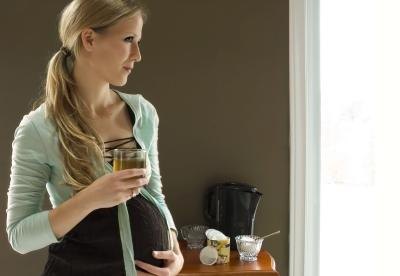
Green tea is a non-herbal tea made from unfermented leaves. Green tea may have more health benefits than the more popular -- in the United States -- black tea. Tea typically contains caffeine, but drinking the decaffeinated version of green tea can lower your caffeine intake, a benefit during pregnancy, when excess caffeine intake could have harmful effects. Green tea is safe to drink in pregnancy as long as you also include other health beverages in your fluid intake.
Benefits
Green tea has been traditionally used in Chinese and Indian medicine to treat a variety of health conditions, including acting as a diuretic and strengthening the heart. Green tea might also help regulate blood glucose and lower cholesterol. The University of Maryland Medical Center states that green tea has more polyphenols, antioxidants that work to neutralize free radicals in your body that destroy cells, than black tea. Green tea may also help protect drinkers against several types of cancer, although studies aren't always clear cut about the benefits.
Considerations
According to the American Pregnancy Association, decaffeinated non-herbal teas still contain some level of caffeine. For example, a regular cup of tea has about 40 to 50 mg of caffeine, while the same amount of decaffeinated tea has about 0.4 mg. Caffeine can cross your placenta and affect your baby, who is unable to metabolize the caffeine. The diuretic effect of caffeine cause you to lose important fluids and nutrients through urine. Avoid consuming more than 150 mg of caffeine per day during pregnancy.
Transition
If you're used to drinking regular green tea, it may be difficult to adjust to decaffeinated green tea. Withdrawing from caffeine suddenly can cause symptoms like headaches, irritability and lethargy. You can help reduce some of these symptoms by gradually cutting back on regular green tea. Try mixing regular green tea with the decaffeinated version and gradually reducing the amount of regular tea.
Recommendations
Although green tea has antioxidants, you need the benefit of other nutritious beverages during your pregnancy. Milk offers vitamin D and calcium for your baby’s developing bones, and 100 percent fruit juice and water are also healthy ways to hydrate your body. If you drink decaffeinated green tea, be sure to talk to your doctor about other ways to include nutritious beverages in your diet.





No comments:
Post a Comment